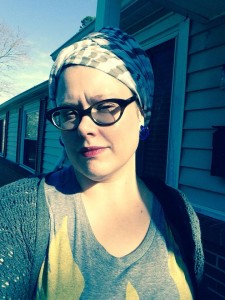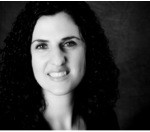Back when people called me Her Excellency, I routinely attended gatherings at the home of Bahrain’s First Lady. Cardamom-flavored coffee appeared in demitasse cups. The servers, always women dressed in traditional robes, poured the golden elixir from a gently sloped carafe called a dullah. The women returned at regular intervals with refills until you shook the cup to signify that you wanted no more.
My marriage felt like a fragile container that held the riches of the world, and one that I tilted over when I no longer tasted myself in the swallow.
I asked my husband to marry me while driving on 16th Street in Washington, DC. We had met months earlier in New York City because of landmines; he was an international expert in the removal of bombs buried within the earth. I was twenty-seven years old and lonely in ways that felt flawed and unlovable. This man arrived well-pedigreed with international accolades and a collection of five small children from his first marriage. I felt that he represented my only chance at love, and I am blessed that he turned out to be kind.
Twelve years later, I asked him via email to let me leave.
The prior evening, I had passed time a room where four people allegedly committed suicide. I sat in the pitch black haunted air and had philosophical discussions with a religion professor and his wife about love, life and the mysteries of the world. We were in an abandoned asylum seeking ghosts; the ones that, allegedly, go bump in the night, while discussing lofty ideas by way of Heidegger and W.B. Yeats. I kept thinking of a saying attributed to Yeats that seemed appropriate for the evening’s unseen traumas: “Too many things are occurring for even a big heart to hold.”
By that time, my marriage was floundering in a gap shaped by three years of living in two different spheres of the world: my husband was in Sudan managing the split of one country into two. I lived in a posh part of a small Southern city managing the stepchildren. In this absence, I had published my first book and coddled my demons with less frequency. Writing meant that I could finally taste my voice, and it traveled down my throat like exquisite cardamom-spiced coffee. The parched nature of my soul, and my subsequent hunger, felt frightening.
In the room where four people failed to muster the will to live, I saw a vision of my marriage as a fatigued Sisyphus, rolling a rock up an impossible incline that never summited. My arms felt heavy from pushing so much psychic weight.
I came home the next morning to a house reeking of trash that my teenage stepsons had failed to take out. The stink hit me in the face and ruined the taste of possibility that brewed in my mouth. I pulled a coffee mug from the cabinet and I let it shatter on the kitchen floor. I pulled out another, and another. My eldest stepson peeped out of his bedroom, unsure of what had possessed the madwoman in the kitchen.
I went upstairs and wrote, “I can’t do this anymore,” to my husband, and then I hit SEND.
A weighty ghost looked back when I gazed into a mirror, telling me that I’d never survive on my own. I had to choose between being haunted with my husband’s version of my life where I had to fold into the carefully constructed boundaries of his world. Or, I could cross over to who I wanted to become. I believed in the long haul of marriage, even the messy moments with the wane and return of affection between two people who share a life. I never stopped caring, I wanted the chance to tell my husband. I am leaving because I feel no love for myself.
“Americans sometimes just fall out of love with people,” he had said during the early days of the marriage, “for us, when you marry is planned by God.” I wondered if God had intended marriage to be such a sad place even when two people had tried hard to make it happy. My husband had taken a chance on a white American woman, and, in return, he became the first Afghan man in his family to have a woman leave.
I wondered if God still loved me.
What I saw when I looked in the mirror was a fat girl, a college dropout who couldn’t see anything beautiful about her reflection. I worried how fate would calculate my punishment and the consequences of severing from ready-made, familiar love. I left a good man and a global sized identity that couldn’t let me become who I needed to be. This was a First World White Girl reason that made me feel ashamed, no matter how much truth it packed.
Everything about the marriage seemed complicated and anomalous — from the earth-sized components, to single parenting so many children, to the union’s legal state. When I wanted to leave, I realized that I wasn’t even married.
One lawyer suggested this was to my advantage. “You don’t have to file for legal separation. You can go. Just like that,” he said. Another lawyer shamed for not making it legal, “You knew better,” he spewed, licking the Southern white boy spittle that dripped from his lips, “and now you don’t have any right to financial support.” He suggested I return to the marriage, buy some time, save up money.
I had not worked in twelve years. There was no alimony. I had nothing except Ibrahim, our eleven-year-old son, a car with 80,000 plus miles, and a few pieces of original art from my world travels. I did not hold my survival skills in high regard.
Three months after I sent that email, the final divorce decree arrived around midnight over an international call and in the absence of lawyers.
“Well, I have to do this for a third and final time,” my now ex-husband said. Restraint rested in his silences. “It is now done.” I wondered if he had this date circled on a calendar, if a ting alert on his phone had disrupted his early morning routine to remind him of the hour, the minute, he’d make a call to release part of his life back into the wild.
I lay in the large bedroom that had seen too little of him with a ceiling fan that ticked to some cosmic clock that I could not yet decipher. This was another task, another life project, where I had refused matriculation. I cringed as the vastness of my former world closed around me. The consequence of leaving this marriage was more than the loss of financial security. I left to make room for becoming a better person, yet I had a hard time finding my good parts.
A few months after the divorce, he briefly returned to the United States with one objective: to go appear together in Washington, DC to obtain Ibrahim’s expedited passport, who was to spend the summer in Khartoum.
In the five hours it took to get to D.C., we argued like we were still together. We disagreed about the route. We held each other responsible for the traffic. I blamed him for the hotel choice, the one that we almost didn’t find because of my poor map reading skills.
I commented that he’d have another wife within a year. “I doubt it,” he said. “I do not plan to marry again.”
“Why not?” Ibrahim chirped, leaning in from the backseat towards his father. “You are a good person.”
“I am a good person, but your mother didn’t think so,” he said, not unkindly.
“I never said that you weren’t good,” I commented.
Our son’s head jutted into our front seat space between us, “Both of you are really good people, even if you aren’t married to each other. OK. Both of you are good people.”
***
As we waited for Ibrahim’s passport arrival by mail, my ex-husband slept in the guestroom of our five-bedroom, three-bath house that we’d purchased upon my return to the United States with six children in tow. He had never spent much time there. My belongings were now box-bound with no place to land.
The tempo of habitual routines remained throughout the week. We sat down as a family for meals. I would text him to pick up items at the grocery store. We continued an old conversation from the past as if no distance existed between us.
One afternoon, he started preparing kabuli palow, a traditional Afghan dish. I looked up to see him pouring rice into a colander while a heap of candied raisins and carrots glistened by the sink. It was a scene I’d witnessed often throughout the marriage. His hands dipped into the milky water as he shifted the rice around, the kernels spinning like atoms constantly calculating new directions and possibilities. He did not know that I watched him.
I saw myself rise out of my body. The floor plan of the kitchen and living room spread below. I saw the back of his broad neck, a hairline in need of a trim. His hands dropped in and out of the colander. I saw myself staring at him from the other side of the room.
Oh my God, I want good things for him, I realized.
Even if he was no longer my husband, I understood that my love for him wasn’t smaller than before nor did it come from brokenness. This kind of love was just different. My heart stopped wobbling, and for a moment, I felt tender and full.
—–
Deonna Kelli Sayed is a Love, Inshallah editor and author of Paranormal Obsession: America’s Fascination with Ghosts & Hauntings, Spooks & Spirits. Deonna also produces Love,Inshallah’s author interview podcasts. She is a recipient of a 2013 North Carolina Arts Council Regional Artists Grant for her memoir project in progress. She is also busy producing a (forthcoming) digital storytelling project called A Little Podcast. To learn more, visit her website, and join her on Facebook and Twitter.















